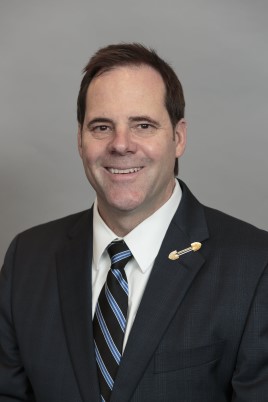WEF 2018-19 President Tom Kunetz blogs about the importance of investing in research
Federal investment in research has a long history that can be traced back to before the start of World War II: With war looming, an MIT professor named Vannevar Bush convinced President Franklin D. Roosevelt of the need for the federal government to invest in basic research.
Advancing Research Supports Society
This research needed to be done in partnership with universities and industry to generate new technologies that would bring the United States into a more secure, defensible position in the future. In response, Roosevelt created the Office of Scientific Research and Development (ORSD) and assigned Bush as its first leader. ORSD went on to create technologies that yielded more accurate bombs, reliable detonators, guided missiles, radar, medical treatments and the first atomic weapons that helped the Allies win the war.
The investment of federal money into basic research throughout the decades since World War II ended has led to many advances in science, engineering and medicine that we enjoy today. “For the past 50 years, the rational exuberance of the American economy has been propelled by the combination of three innovations: the computer, the microchip, and the Internet. The research and development that produced each came from a triangular alliance of government, academia, and private business,” according to Walter Isaacson in his Time magazine article.
Yet, for all the benefits that the investment of public funds into research has provided to society, the relative investment Congress has made in research as a percentage of the gross domestic product has declined significantly since the 1970s. This decline has been based on the premise that research is a function of the private sector and does not belong in the public sector. Similar trends are happening in Canada, though the Canadian Parliament seems a little more willing to fund research than its U.S. counterpart.
In sharp contrast, China and South Korea have become the new innovation giants. Government money is allocated toward basic research in fields that are expected to pay big dividends for their countries’ economies in the world market. China is preparing to become the leading nation in artificial intelligence technology, while South Korea has invested approximately $300 million in the construction of the Korea Water Cluster in Daegu Metropolitan City to promote and enhance Korean water industries. South Korea’s goal is to become the leading technology provider in the water sector worldwide.
WEF Steps Up to Support Research
While the U.S. and Canada water sectors — along with folks from the transportation, energy, telecommunications, and medical sectors — continue to lobby their governments to increase public funding for research, there is something that can be done at the local level to keep essential research alive: Public utilities can sponsor research at their local and state universities.
WEF provides numerous resources to develop partnerships that support research. This includes the University-Utility Partnership (UUP), a program supported by WEF’s Research and Innovation Committee, and the Leaders Innovation Forum for Technology (LIFT) program. The UPP helps increase the number of university-utility research projects by driving the awareness of the value proposition such partnerships have for both the participating universities and the utilities. UUP guidelines provide information on very practical administrative issues such as finances, template agreements, partnership promotion through public outreach, and steps to handle intellectual property rights. A LIFT technical report, released in 2018, details best practices and provides more than 10 case studies. Also, in summer 2019, look for a special issue of Water Environment Research, WEF’s peer-reviewed research journal, focused exclusively on the results of UUPs.
Making a Deposit in Scientific Capital
I believe that it is part of the public’s duty to support research at the local and state levels. Every public utility — and, by extension, its customers — have benefitted in many ways and through many decades from technological advances that were funded by someone else in some other state. Each utility should, in return, take its turn to make its contribution to the body of scientific knowledge from which all of society benefits.
Vannevar Bush’s vision of a partnership between government, academia, and industry proved prophetic. In making the case for the ORSD he wrote to President Roosevelt that research is “[the] scientific capital…the fund from which the practical applications of knowledge must be drawn.”
Our scientific capital account is overdrawn. It’s high time we make a deposit.
Read more about this topic in the WEF Highlights column, “From the President: Advancing Research, the Scientific Capital.”


